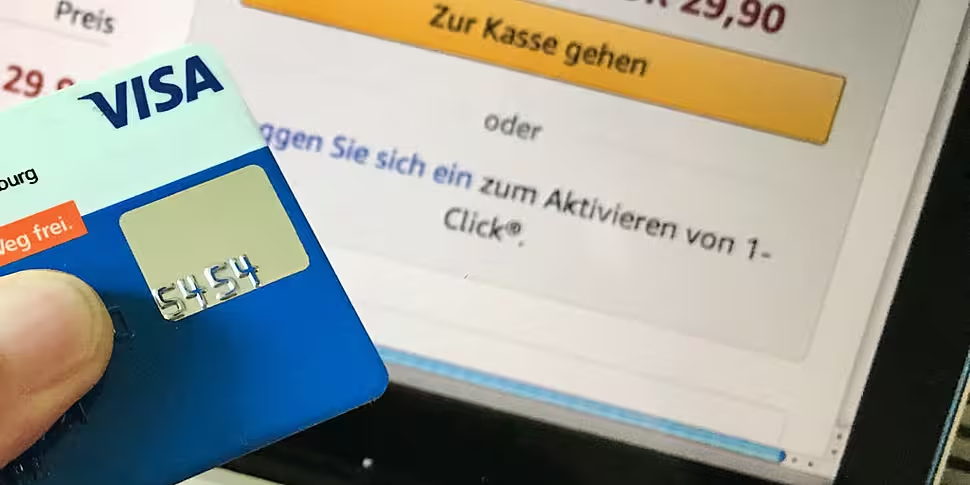Customers have been warned about potential scams ahead of an expected surge in online shopping for so-called Cyber Monday.
Over €4bn of online purchases using cards is expected between November and December.
An Garda Síochána and FraudSMART have issued a strong warning to consumers to be extra cautious.
They are being urged to make purchases using only secure websites, where 'https' and a padlock symbol are on display.
They should not use public Wi-Fi when making payments - and switch to 3G/4G if necessary.
They are also being advised to independently visit the website of the online sales company, as opposed to clicking on social media or pop-up adverts.
People should also be cautious about claiming outrageous offers: if it sounds too good to be true, it probably is.
And they should stick to well-known websites, websites that they are familiar with - or those associated with high street retail outlets.
 A woman uses a laptop to browse the Amazon website | Image: Tim Goode/PA Archive/PA Images
A woman uses a laptop to browse the Amazon website | Image: Tim Goode/PA Archive/PA ImagesAlmost €12bn was spent using cards between November and December last year, with well over €4bn of that spend accounted for e-commerce.
Purchasing online is growing among Irish consumers: €41.3bn of purchases were made with cards in the first nine months of this year - with some €20.1bn of that spending carried out online.
Detective Chief Superintendent Pat Lordan, of the Garda National Economic Crime Bureau, said: "As the pre-Christmas rush draws thousands of shoppers online, we urge that people be aware of the potential for fraud, whether they are buying or selling a product.
"People should be particularly careful when high value products are offered at prices significantly under market value and when there is a demand for payment in advance to a person or entity that are not known or not clearly identifiable".
Olivia Buckley, head of fraud prevention FraudSMART, added: "In the region of 75% of all card fraud occurs online, so serious caution is required when purchasing goods or services.
"The large volumes of online purchases expected to be made this week means fraudsters will be attempting to lure consumers into fraudulent websites, while posing as authentic suppliers.
"The most popular goods purchased online are clothes and sportswear, along with household goods".
Common scams
The following are the most common fraud scams used to try and get card details.
Phishing is where criminals send unsolicited e-mails to individuals which purport to have been sent from genuine businesses or individuals.
The purpose of these is to get the individuals to reveal personal information - such as payment card details, bank account numbers and personal security data.
Phishing e-mails usually appear to have been sent from a bank or financial institution, and instruct the person to follow a link to a fraudulent website which requests personal information.
Vishing, or voice phishing, happens over the phone in order to obtain personal, financial or security data from people.
While smishing - or SMS phishing - is a phishing attack whereby a mobile phone user receives a text message which purports to have been sent from a genuine business or individual.
This message attempts to get the person to follow a link to a website which appears to be legitimate, but is under the control of a criminal organisation.
This website then requests personal and financial information.
Guaranteed Irish
Meanwhile, Guaranteed Irish is calling on shoppers to consider their impact on local jobs.
It is reminding consumers to be conscious of Black Friday's impact on homegrown businesses, and to shop local where possible.
According to the Central Statistics Office (CSO), September saw a month-on-month 2% increase of retail sales and an increase of 2.1% in the annual figure - excluding motor sales.
Retail Ireland reports the average Irish household spent €2,690 over the 2018 Christmas period, a third consecutive annual increase for year-on-year spending.
Brid O'Connell, Guaranteed Irish CEO, said: "Guaranteed Irish members collectively employ 73,000 people nationwide.
"As a brand, Guaranteed Irish represents all that is good about Ireland - so look out for it.
"By supporting Guaranteed Irish businesses, you are retaining jobs in your community and supporting your local economy. We ask you to consider this, whether buying on- or offline."









